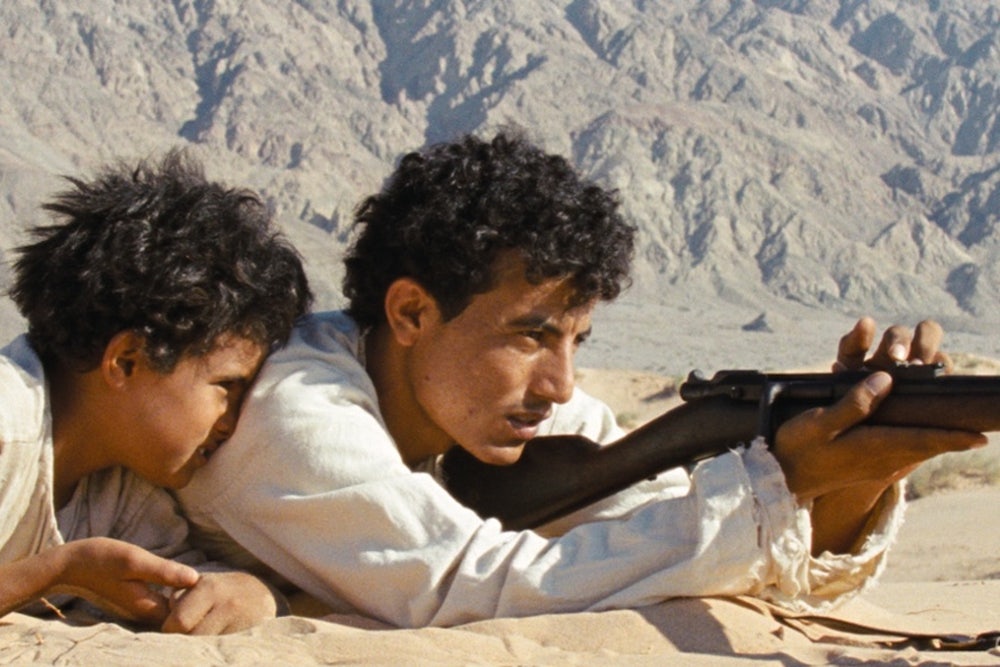We tend to overlook the Ottoman Empire’s role in World War I. In this country, at least, we generally focus on the Western Front, on the shell-shocked young men dying in muddy trenches remembered in Wilfred Owen’s poetry. When we do remember the Ottoman role in the Great War, we remember it not from their perspective, but from the colonial one: We remember David Lean’s epic 1962 adventure film Lawrence of Arabia.
In that sense, Theeb, Jordan’s first-ever Oscar nominee and British-Jordanian director Naji Abu Nowar’s debut film, is an inversion of Lawrence of Arabia—a film told from the perspective of Arab bedouins rather than colonial adventurers, a scrappy coming of age story rather than a grand tale of epic, colonial ambitions. It takes place in southern Jordan in 1916—the same year in which Lawrence of Arabia is set, and owes a great deal, especially its stunning cinematography, to Lean’s film. But while World War I, the collapsing Ottoman Empire, and the incursion of modernity are all central to the film’s themes and development, Theeb’s appeal is that it takes place almost entirely in the margins of empire and war.
While the war rages elsewhere, the small Bedouin community at the center of Theeb is more concerned with the advent of the locomotive, which is threatening their traditional livelihood of guiding pilgrims through the hostile desert. Eleven-year-old Theeb (Jacir Eid) is the youngest of three sons, the older of whom are both guides. Theeb is immediately introduced as an insatiably curious boy, a kind of bedouin Calvin (sans Hobbes) who can’t help but get himself into trouble as his older brothers try to teach him how to be a man.
War finally makes it into the remote desert in the form of a British officer (Jack Fox), who is traveling with an Arab ally on a secret mission involving a mysterious wooden box. When his brother, Hussein (Hussein Salameh, Eid’s cousin in real life), leaves with the British soldier, Theeb sets off without permission behind him, flies buzzing about his head. He catches up with them at a well, but things quickly turn sour. When the Englishman goes for a drink, he finds only blood. There are bodies in the well.
After a series of bandit attacks, Theeb is the only one left alive. But he’s stranded. Even if he knew the way to the next well, he wouldn’t make it alone. Help does come, finally, but in the badly wounded form of one of the bandits who attacked their party. Theeb is faced with an obvious dilemma: He needs help to escape the desert, but the only way he can get help is by helping the man who killed his brother. The rest of the movie follows the strained relationship between the odd couple, simultaneously suspicious of and utterly dependent on one another, as they travel to a railway station to sell the box the Englishman was carrying to the Ottomans.
Nowar has described Theeb as an “Arabic western” and the film has been compared to Sergio Leone’s spaghetti westerns, in addition to Lawrence of Arabia. But while Theeb has its share of the epic—its shots of camels crossing the Jordanian desert are astonishing—those comparisons don’t capture how intimate a movie it is. There’s a certain scrappiness to Nowar’s direction—and the 16mm film certainly helps—that makes it more visceral than its predecessors. The majority of the film plays out around one very claustrophobic well, and the desert teems with devastation, its emptiness a prelude to something darker: bandits setting traps or wolves descending at night to take the dead. Theeb is an adventure story, sure, but it’s a claustrophobic and terrifying one, like The Revenant if you cared about any of the human characters.
There are many remarkable things about Theeb: its balance of the epic and the intimate, its stunning and self-assured direction and cinematography, its novel take on both the bildungsroman and the Western. But perhaps the most remarkable is its cast, which, with the exception of Fox, is entirely made up of amateurs—Bedouin tribesman who rehearsed with Nowar for months before filming began. Best of all is Eid, who is in nearly every frame of Theeb and commands every second of it. It’s always risky to tell a story from a child’s perspective; the child either becomes a vessel for a fable or a metaphor for lost innocence. But thanks to Eid’s ability to showcase a range of complicated, conflicting emotions, that’s never the case here. Theeb is just a boy, and the film is always his.
Which brings us back, finally, to World War I. Theeb is in command of the geopolitical realities of its setting, but it’s ultimately more concerned with how war, conflict, and change affect individuals. In doing so, it becomes a kind of morality tale, but a deceptive one. The movie is full of binary pronouncements: “The strong eat the weak;” “If the wolves offer friendship, do not count on success.” This is, in some ways, similar to the binary central to Lawrence of Arabia—Lawrence’s divided loyalty between colonizer and the colonized. But Theeb takes it a step further: It isn’t torn, a la Lawrence, between which side is in the right, but instead recognizes the inherent wrong that conflict instills in every party involved. By the end of the film, it’s not clear who the strong or the wolves are, let alone who is good or evil. Instead, there are only those who survive and those who don’t. Theeb ultimately serves not to retell any version of this story we’ve heard before, but to offer us an unusual, fresh look at a key moment of twentieth-century history.
For more Oscar coverage, click here.
